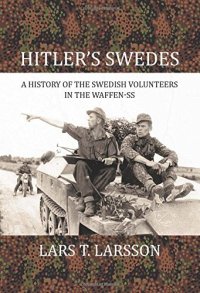
Ebook: Hitler's Swedes: A History of the Swedish Volunteers in the Waffen-SS
Author: Lars T. Larsson
- Publisher: Helion and Company
- Language: English
- pdf
Sweden was neutral during the Second World War, but despite this, thousands of Swedes wanted to participate in the war - the largest group in Finland, where over 10,000 Swedes applied to fight against the Red Army. Another much smaller group, which saw action against the same enemy, was the Swedish SS volunteers. While the Danish and Norwegian SS volunteers are fairly well known today, their Swedish counterparts remain more unknown. Still, they saw action on both the Eastern Front and NW Europe, and participated in some of the bloodiest clashes: the initial stages of Operation Barbarossa, the winter of 1941/42, the battles of Kursk, Arnhem, Normandy, Narva, the Warsaw uprising, the Cherkassy and Kurland pockets and, finally, the end in Berlin.
Compared to many other groups of volunteers, there was never an official recruitment drive in Sweden, which is why only some 180-200 men enlisted. Those who wanted to recruit themselves often had to make their way to the occupied countries - a fact that makes those Swedes who joined the SS volunteers in the truest sense. As such, this book is as much a history about the units, which the Swedes served in, as it is a story about the individuals themselves. It also asks, who were they? What motivated them? What did they experience and how did their service end?
With the help of diaries, letters, interviews, police interrogations and German documents from both private and official archives, the history of the Swedish SS volunteers is reconstructed. The main focus is on those who served at the front, including volunteers in the 'Wiking', 'Nordland', 'Nord' divisions, minor units such as the Den Norske Legion, SS-Panzer-Brigade 'Gross' and the war correspondents of the SS-Standarte 'Kurt Eggers'. Also included are the Swedish non-combatants in the SS, such as the desk clerks within the SS-Hauptamt and security service personal of the RSHA.
The book lets us follow individuals such as Hans Lindén, who was the first named Swedish volunteer to fall in action aged barely 19 years old; the unpopular Swedish SS officer Gunnar Eklöf; Elis Höglund, who after several years on the Eastern Front deserted and returned to Sweden; Gösta Borg, who volunteered for the SS a second time as he was denied the chance of becoming an officer in Sweden; and Karl-Axel Bodin, the only Swede to be included in the list of suspected criminals at the Simon Wiesenthal Center, who joined the SD in March, 1945.
The book includes over 150 photos, everything from civilian photos, portraits from the men's time in the SS, pictures taken in the field, post-war photos and documents. Most are from the private albums of the volunteers and many are previously unpublished.
Thoroughly researched from primary sources, and providing plenty of absorbing detail, this book is a valuable addition to the history of the SS, and the men who volunteered to serve in it.
Compared to many other groups of volunteers, there was never an official recruitment drive in Sweden, which is why only some 180-200 men enlisted. Those who wanted to recruit themselves often had to make their way to the occupied countries - a fact that makes those Swedes who joined the SS volunteers in the truest sense. As such, this book is as much a history about the units, which the Swedes served in, as it is a story about the individuals themselves. It also asks, who were they? What motivated them? What did they experience and how did their service end?
With the help of diaries, letters, interviews, police interrogations and German documents from both private and official archives, the history of the Swedish SS volunteers is reconstructed. The main focus is on those who served at the front, including volunteers in the 'Wiking', 'Nordland', 'Nord' divisions, minor units such as the Den Norske Legion, SS-Panzer-Brigade 'Gross' and the war correspondents of the SS-Standarte 'Kurt Eggers'. Also included are the Swedish non-combatants in the SS, such as the desk clerks within the SS-Hauptamt and security service personal of the RSHA.
The book lets us follow individuals such as Hans Lindén, who was the first named Swedish volunteer to fall in action aged barely 19 years old; the unpopular Swedish SS officer Gunnar Eklöf; Elis Höglund, who after several years on the Eastern Front deserted and returned to Sweden; Gösta Borg, who volunteered for the SS a second time as he was denied the chance of becoming an officer in Sweden; and Karl-Axel Bodin, the only Swede to be included in the list of suspected criminals at the Simon Wiesenthal Center, who joined the SD in March, 1945.
The book includes over 150 photos, everything from civilian photos, portraits from the men's time in the SS, pictures taken in the field, post-war photos and documents. Most are from the private albums of the volunteers and many are previously unpublished.
Thoroughly researched from primary sources, and providing plenty of absorbing detail, this book is a valuable addition to the history of the SS, and the men who volunteered to serve in it.
Download the book Hitler's Swedes: A History of the Swedish Volunteers in the Waffen-SS for free or read online
Continue reading on any device:

Last viewed books
Related books
{related-news}
Comments (0)